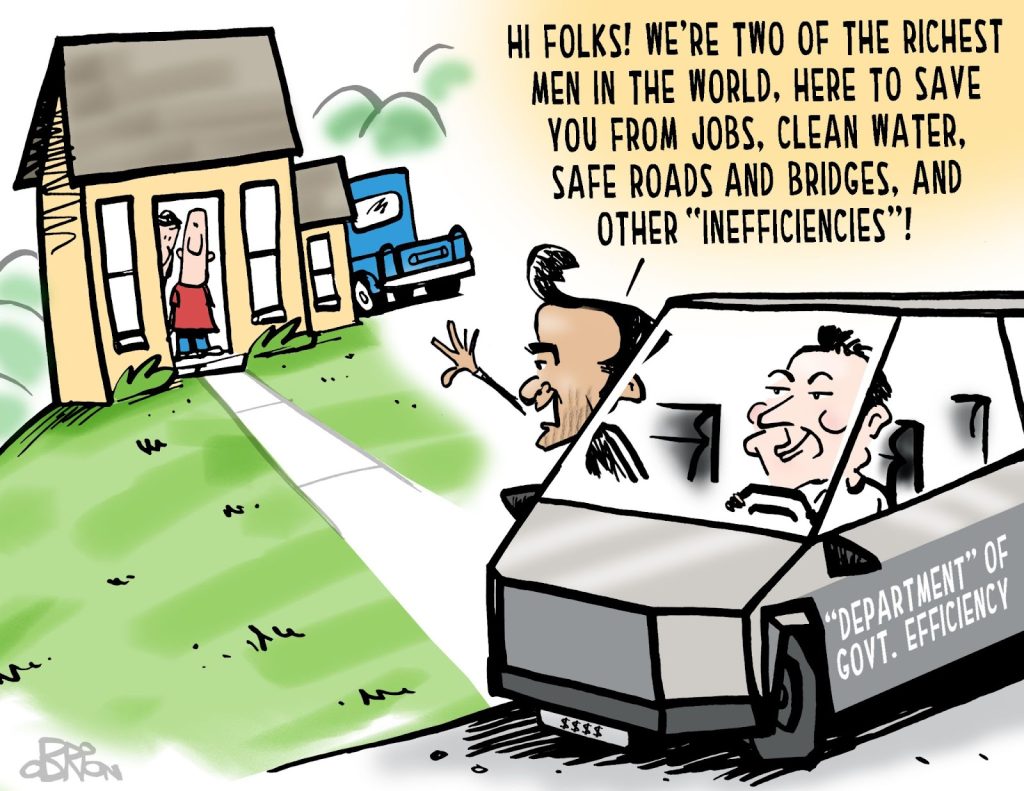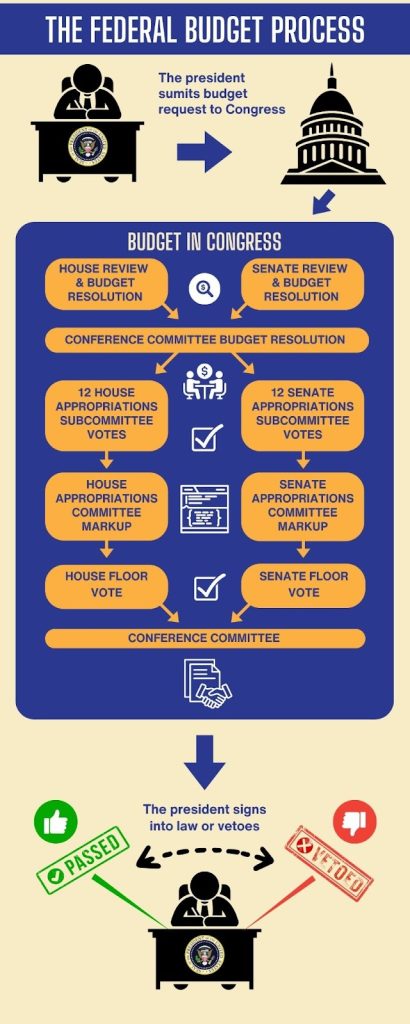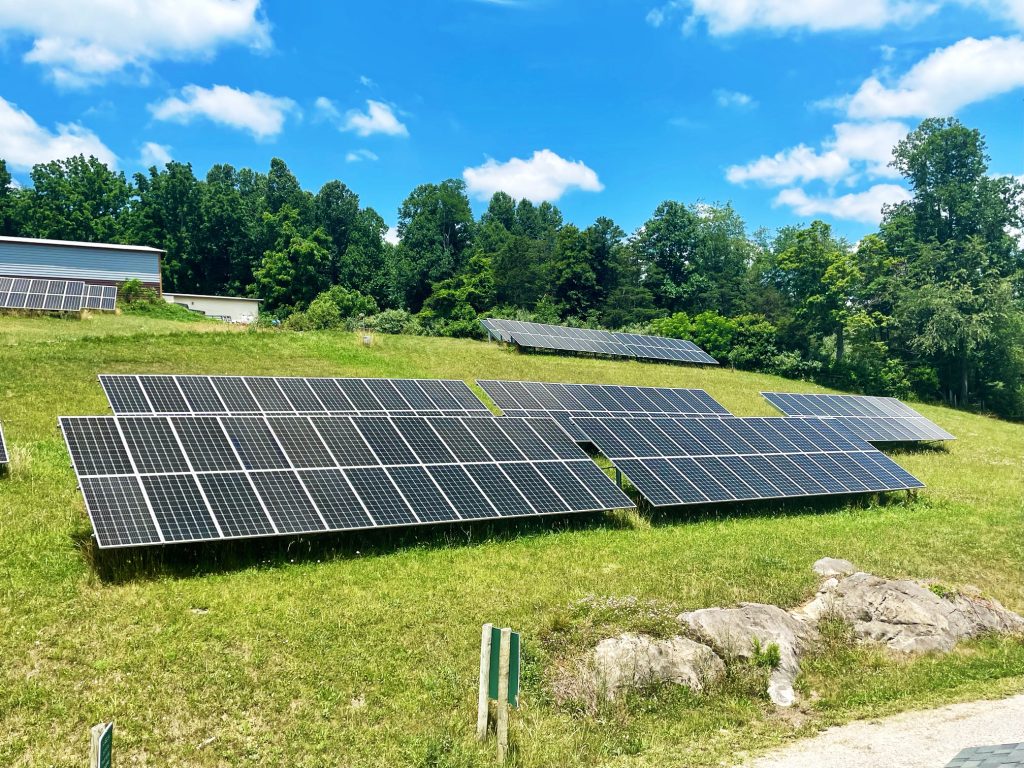Front Porch Blog

After the 2024 election, President-elect Donald Trump announced the creation of a new “Department of Government Efficiency” to be co-led by Tesla Motors and SpaceX CEO Elon Musk and biotech entrepreneur Vivek Ramaswamy. These two heads of the unofficial government department will not be federal employees, but rather consultants who will provide a plan to Trump for him to implement.
The two billionaires penned an op-ed in the Wall Street Journal on Nov. 20 that outlines their proposals. As part of their plan for more “efficient government,” the co-heads outlined a multi-point proposal for reducing the size of the federal government. In this blog series, we will describe the possible impacts of their plan on the people of Appalachia.
Part 1: Defunding of “Unauthorized” Programs
In their Wall Street Journal op-ed, Musk and Ramaswamy stated they will end government overspending by halting funding for any program that does not have a current authorization from Congress. This proposal would take a sledgehammer to government spending, not a careful scalpel. This is a bit of a wonky issue, but it’s important to understand.
Essentially, Congress controls government spending through two types of bills:
- Authorization bills establish agencies, programs or activities of the federal government. Authorization bills basically tell government agencies how to spend money, and typically have an expiration date. The expiration date exists so that Congress will provide oversight and make any necessary changes to the agency or its programs.
These bills are approved by the relevant committee of jurisdiction — for example, the Senate Energy and Natural Resources Committee and the House Energy and Commerce committee both have to approve any bill that impacts the Department of Energy. When Musk and Ramaswamy talk about programs having current authorization, this is what they are referring to. - Annual appropriations bills provide the money for the authorized agencies, programs or activities. Appropriations bills are completed on a fiscal year basis, and are approved through the Senate and House Appropriations committees. Each year, Congress passes funding through the appropriations process for programs that it has failed to reauthorize. Musk and Ramaswamy’s framework would yank away funding for programs that are currently funded this way.
(Note that Congress can also control agency spending through a third type of bill known as budget reconciliation, but this type of legislation has certain limitations.)

This is how Congress is supposed to function; however, for a variety of reasons, Congress has allowed more than 1,500 programs and agency authorizations to lapse, with another 152 expiring at the end of the current fiscal year. Congress has continued to fund most of those programs and agencies through the annual appropriations process.
Every year, the Congressional Budget Office publishes a report detailing expired and expiring program authorizations. The January 2024 report identified 1,264 authorizations that expired before the beginning of fiscal year 2024, and another 251 that are scheduled to expire before the end of fiscal year 2024. CBO estimates that $516 billion in appropriations for 2024 was associated with 491 expired authorizations of appropriation (some of the expired programs no longer receive appropriations).
These programs notably include the Federal Bureau of Investigation, the Drug Enforcement Administration, Bureau of Alcohol, Tobacco, Firearms and Explosives, the National Weather Service, the Consumer Financial Protection Bureau, the Federal Trade Commission and the Federal Election Commission — all entities that Musk and Ramaswamy would abolish with their proposal to cease funding any unauthorized agencies and programs. Appalachian Voices is not well-positioned to describe the impacts of shutting down these entities, but it’s helpful to understand the breadth of the DOGE proposal.
The reasons Congress fails to reauthorize these laws can vary — in some cases, reauthorization would bring very difficult political issues to the forefront, and it’s easier to just keep funding the program or agency on a year-to-year basis. In other cases, it’s just that the reauthorization isn’t all that important for Congress to prioritize because the issue isn’t politically controversial. With a backlog of hundreds of lapsed authorizations, it would take a lot of time for Congress to reauthorize every single program or agency on the list. So instead, members of Congress vote to fund a vast assortment of “expired” programs through the appropriations process.
We all want our government to operate efficiently and effectively, and Congress should be more deliberate about how it spends taxpayer dollars. But the slash-and-burn approach proposed by Musk and Ramaswamy is dangerous and harmful for people all across the country, including our Appalachian communities.
Notably, their proposal to cut funding for “unauthorized” programs would mean the end of programs and agencies that directly benefit Appalachians, including:
- The Department of Housing and Urban Development’s Community Development Block Grants. This program provides funding for states and localities to support economic development, community development, and infrastructure for low- and moderate-income communities. For example, the coalfield community of Dante, Virginia, received a CDBG grant in 2021 to improve water quality for 240 households by adding and improving sewer treatment services, and to support a regional wastewater project.
Each state and certain local governments receive CDBG funding on an annual basis: In Fiscal Year 2024, West Virginia received $20.5 million in state and local CDBG awards; Virginia received $58.3 million; Tennessee received $50 million; Kentucky received $43.6 million; and North Carolina received $77.5 million. The program has not been reauthorized by Congress since it expired in 1994, even though Congress funds it annually through appropriations bills, and would therefore be eliminated under the DOGE plan.
- The entire Pipeline and Hazardous Materials Safety Administration, and associated grants that the agency administers for pipeline safety and emergency response. This agency is responsible for overseeing 3.3 million miles of pipelines in the U.S. and the transportation of billions of tons of hazardous materials. Notably, this agency identified numerous safety violations along the Mountain Valley Pipeline route and is responsible for ensuring the company remediates dangerous problems with the pipeline so that the pipeline doesn’t rupture or explode. More than 60 million people live within 1 mile of a natural gas pipeline, and there are many other types of pipelines.
While Appalachia’s mountainous terrain has made it a less appealing region for pipeline development than other parts of the country, there are still thousands of miles of pipelines in the Appalachian region, with significant expansion planned by the region’s major electric utilities. Eliminating PHMSA would leave millions of people at risk from pipeline explosions, water pollution, landslides, and more.

- The Economic Development Administration, which provides grants and technical assistance to economically distressed communities to create new job opportunities and maintain existing jobs. Notably, the EDA dedicates a significant portion of its funding to coal communities to help with recovery in places hit hard by coal’s decline.
The U.S. House recently passed a bill to reauthorize the EDA for five years through FY 2029, but it has yet to pass the Senate. If the bill isn’t signed into law before the DOGE plan is implemented, the EDA program would be cut entirely under Musk and Ramaswamy’s proposal. The EDA has supported numerous job-creating economic development projects in Appalachia through its Coal Communities Commitment, including a $62.8 million project in West Virginia that supports a hub of clean energy and green economy jobs, creating 5,000 new direct full-time jobs, 15,000 indirect jobs and 125 new businesses.
Elimination of the EDA as proposed in the DOGE plan would mean Appalachian communities would lose out on millions of dollars of federal funding for locally-driven economic growth every year, and perhaps thousands of new jobs per year.
- Numerous Department of Agriculture rural development programs, including the Rural Business Development Grants, Rural Business Investment Program, Rural Energy for America Program, Solid Waste Management Grants, Rural Decentralized Water systems, Rural Energy Savings Program and the Supplemental Nutrition Assistance Program, just to name a few. Many of these programs have not been reauthorized since Congress failed to pass a Farm Bill when the last one expired in 2023. A one-year extension passed in 2023, but expired Oct. 1 of this year.

All of these programs focused on supporting rural Americans have enormous benefits in Appalachian communities. For example, between 2014 and 2024, the Rural Energy for America program has supported over 1,700 projects across Kentucky, North Carolina, Tennessee, West Virginia and Virginia alone, backing or directly funding over $1.3 billion in clean energy and energy efficiency projects at farms and rural businesses, and indirectly supporting hundreds of clean energy jobs. Read more about this program and its impact in Appalachia in our report, Rural Energy for America Program: Working for Appalachia.
- The Environmental Protection Agency’s Brownfields program, which provides grants and technical assistance to communities for cleaning up contamination from abandoned industrial sites. The authorization for the program expired in 2023, and while Congress has been working on reauthorization bills, they have failed to pass so far this Congress. Appalachian communities have used the brownfields program for environmental and economic development projects since the program began in 1995, including recently the Three Ridges Destination Center in St. Paul, Virginia, the Black Diamond Warehouse project in Huntington, West Virginia, and the Marianna Miners Memorial Park in Pennsylvania, each of which is described in the Reclaiming Appalachia Coalition’s 2023 report.
Brownfield projects create jobs and clean up environmental hazards such as lead, petroleum, asbestos, volatile organic compounds (VOCs) and arsenic. This program would be completely eliminated under the DOGE proposal, leaving people across the country to deal with polluted air, water, and soil, not to mention the lost economic and job growth opportunities that come along with those grants.
The Surface Transportation Board, which regulates railroad construction, the abandonment of rail lines, rail traffic interchanges, intercity bus carriers, moving van companies, trucking companies, and other surface transportation issues. This board is of particular interest in the Appalachian coalfields, as many railroads have long been dependent on the coal industry, which has declined significantly in recent decades.
This is only a handful of examples of the programs that would be cut under the DOGE plan; numerous other programs would impact nearly every aspect of American life, such as health care, education, agriculture, national defense, consumer protections, veterans programs, scientific research, energy development, and more.
The proposal from Musk and Ramaswamy would be devastating for Appalachia: disrupting economic recovery in coal communities, endangering communities with pipelines and/or industrial pollution and eliminating programs that help low- and moderate-income people everywhere make ends meet. Congress must reject this plan outright, and consider each program and its benefits carefully as it decides where, how and whether to reduce government funding.
In the next blog in this series, we will discuss how Musk and Ramaswamy plan to implement this proposal given that the Constitution gives Congress the power to control government spending and they are not elected representatives.
PREVIOUS
NEXT

Leave a comment
Your email address will not be published. Required fields are marked *

Leave a Comment